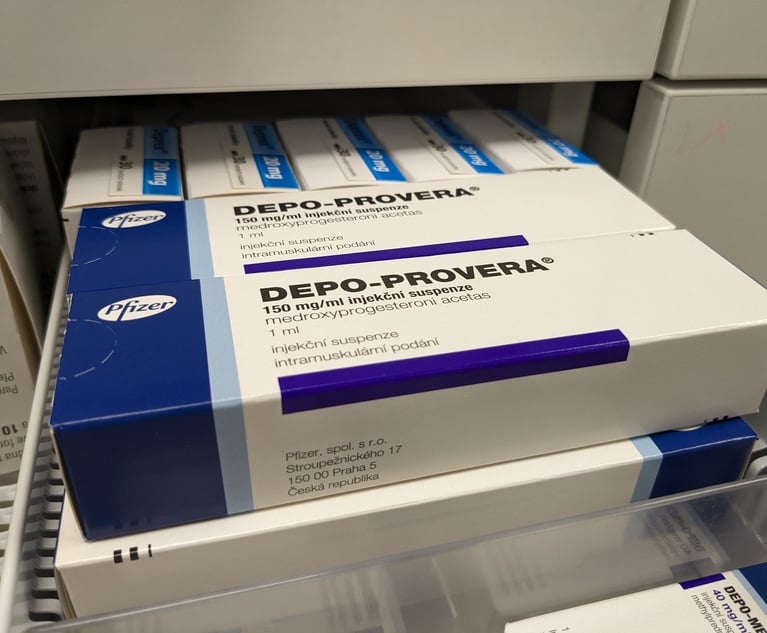 (l-r) Lawrence VanDyke, Halil Ozerden, and Leonard Leo.
(l-r) Lawrence VanDyke, Halil Ozerden, and Leonard Leo.Trump's Year in Judicial Nominees: What Worked, What Didn't and What's Next
From quickly pushing through confirmations to downgrading the importance of the ABA's rating of "not qualified" nominees, Senate Republicans paved the way for President Donald Trump to reshape the federal judiciary.
January 10, 2020 at 12:57 PM
5 minute read
The original version of this story was published on National Law Journal
The president is impeached and tensions are high with Iran—but even the threat of war won't stop the Senate from confirming President Donald Trump's judicial nominees. Among the Senate's first votes after returning from the holiday break were for judicial nominees.
Trump got a record-breaking 187 judges confirmed to the federal bench during his first three years in office, with more than 100 of those approved this past year alone. It's a staggering pace that conservatives are bragging about and liberals are warning could reshape the courts against them for decades.
Will 2020 be more of the same? And what lessons have Senate Republicans learned from the past year of judicial confirmations?
|What Worked
- Ignoring the ABA.
Conservatives in 2019 began piling on the American Bar Association for slapping a handful of Trump's judicial nominees with a "not qualified" rating. The tipping point was such a rating for Lawrence VanDyke, which called him "lacking in knowledge of the day-to-day practice" and questioned if he could be fair to members of the LGBTQ community.
After a tense hearing during which VanDyke cried and Republicans lambasted the ABA, the Senate GOP effectively ignored the rating and confirmed him to a lifetime seat on the U.S. Court of Appeals for the Ninth Circuit. And Republicans began questioning whether the ABA should be allowed to have so much access to judicial nominees.
The ABA doesn't seem to be heading out the door anytime soon. But the group's influence, at least with Senate Republicans, may be waning: The GOP-controlled Senate confirmed seven of the nine judges with the "not qualified" rating since 2017, three of them this past year alone.
- Going fast.
Senate Majority Leader Mitch McConnell hit the gas this year on judicial nominees, pushing through judges so fast that it's helped Trump set records.
According to a tracker from the conservative Article III Project, only President Jimmy Carter had appointed more Article III judges by this point of his presidency. And Trump now holds the record for the most appellate judges confirmed by this time in office, with a quarter of sitting circuit judges now appointed by him.
Democrats don't have much in their tool box to slow down that pace, nor do they seem willing to employ many tactics to delay the confirmations. And with McConnell and Senate Judiciary Committee Chair Lindsey Graham urging older judges to step aside to make way for even more Trump judges, it's unlikely the GOP would want to slow down any time soon.
|What Didn't Work
- Sticking with Mulvaney's man.
It was a rough year for Halil Suleyman "Sul" Ozerden, Trump's pick for a seat on the U.S. Court of Appeals for the Fifth Circuit.
Ozerden's confirmation had been in the air since a testy hearing over the summer, during which Republicans questioned whether he would be a strong enough advocate for "religious liberty" to sit on the panel. And the nominee didn't necessarily benefit from his close relationship with White House acting chief of staff Mick Mulvaney, who found himself at the center of the Ukraine allegations that resulted in Trump's impeachment.
> Sign up for the weekly Trump Watch newsletter here to keep up with the latest legal developments coming from the Trump administration.
Ozerden's nomination lapsed at the end of the year, and it's unclear if he'll get another shot. A White House spokesman said he didn't have any further details about the nomination, and a Senate Judiciary Committee spokeswoman said they haven't heard anything from the White House about whether he'll be renominated.
But that doesn't mean Ozerden won't get to be a judge at all—he still has his seat on the U.S. District Court for the Southern District of Mississippi.
|What's Next
- Outside influence.
While the flood of judicial nominees from the White House and through the Senate is unlikely to change much in the next year, the 2020 election is giving outside groups a chance to campaign on the reshaping of the courts.
Liberal-leaning judicial groups and leaders have said they're frustrated by Democratic presidential candidates' lack of focus on judicial nominees, and say they're working to come up with their own ways to elevate the topic among voters. And the 2020 Democrats are set to get their own presidential forum on the courts days before the crucial New Hampshire primary.
But conservatives, who seized on judges to convince wary Republicans to back Trump in 2016, are stepping up their game.
Influential conservative judicial groups like the Federalist Society are still in the picture, but shy away from overt political actions.
But Leonard Leo's new outfit, CRC Advisors, will have that chance. And they're planning to hit the ground running, with a minimum of $10 million being spent on a campaign amplifying Trump's judges ahead of the presidential election, according to Axios.
This content has been archived. It is available through our partners, LexisNexis® and Bloomberg Law.
To view this content, please continue to their sites.
Not a Lexis Subscriber?
Subscribe Now
Not a Bloomberg Law Subscriber?
Subscribe Now
NOT FOR REPRINT
© 2024 ALM Global, LLC, All Rights Reserved. Request academic re-use from www.copyright.com. All other uses, submit a request to [email protected]. For more information visit Asset & Logo Licensing.
You Might Like
View All

From 'Confusing Labyrinth' to Speeding 'Roller Coaster': Uncertainty Reigns in Title IX as Litigators Await Second Trump Admin
6 minute read
New Class Action Points to Fears Over Privacy, Abortions and Fertility
Trending Stories
- 1Judge Denies Sean Combs Third Bail Bid, Citing Community Safety
- 2Republican FTC Commissioner: 'The Time for Rulemaking by the Biden-Harris FTC Is Over'
- 3NY Appellate Panel Cites Student's Disciplinary History While Sending Negligence Claim Against School District to Trial
- 4A Meta DIG and Its Nvidia Implications
- 5Deception or Coercion? California Supreme Court Grants Review in Jailhouse Confession Case
Who Got The Work
Michael G. Bongiorno, Andrew Scott Dulberg and Elizabeth E. Driscoll from Wilmer Cutler Pickering Hale and Dorr have stepped in to represent Symbotic Inc., an A.I.-enabled technology platform that focuses on increasing supply chain efficiency, and other defendants in a pending shareholder derivative lawsuit. The case, filed Oct. 2 in Massachusetts District Court by the Brown Law Firm on behalf of Stephen Austen, accuses certain officers and directors of misleading investors in regard to Symbotic's potential for margin growth by failing to disclose that the company was not equipped to timely deploy its systems or manage expenses through project delays. The case, assigned to U.S. District Judge Nathaniel M. Gorton, is 1:24-cv-12522, Austen v. Cohen et al.
Who Got The Work
Edmund Polubinski and Marie Killmond of Davis Polk & Wardwell have entered appearances for data platform software development company MongoDB and other defendants in a pending shareholder derivative lawsuit. The action, filed Oct. 7 in New York Southern District Court by the Brown Law Firm, accuses the company's directors and/or officers of falsely expressing confidence in the company’s restructuring of its sales incentive plan and downplaying the severity of decreases in its upfront commitments. The case is 1:24-cv-07594, Roy v. Ittycheria et al.
Who Got The Work
Amy O. Bruchs and Kurt F. Ellison of Michael Best & Friedrich have entered appearances for Epic Systems Corp. in a pending employment discrimination lawsuit. The suit was filed Sept. 7 in Wisconsin Western District Court by Levine Eisberner LLC and Siri & Glimstad on behalf of a project manager who claims that he was wrongfully terminated after applying for a religious exemption to the defendant's COVID-19 vaccine mandate. The case, assigned to U.S. Magistrate Judge Anita Marie Boor, is 3:24-cv-00630, Secker, Nathan v. Epic Systems Corporation.
Who Got The Work
David X. Sullivan, Thomas J. Finn and Gregory A. Hall from McCarter & English have entered appearances for Sunrun Installation Services in a pending civil rights lawsuit. The complaint was filed Sept. 4 in Connecticut District Court by attorney Robert M. Berke on behalf of former employee George Edward Steins, who was arrested and charged with employing an unregistered home improvement salesperson. The complaint alleges that had Sunrun informed the Connecticut Department of Consumer Protection that the plaintiff's employment had ended in 2017 and that he no longer held Sunrun's home improvement contractor license, he would not have been hit with charges, which were dismissed in May 2024. The case, assigned to U.S. District Judge Jeffrey A. Meyer, is 3:24-cv-01423, Steins v. Sunrun, Inc. et al.
Who Got The Work
Greenberg Traurig shareholder Joshua L. Raskin has entered an appearance for boohoo.com UK Ltd. in a pending patent infringement lawsuit. The suit, filed Sept. 3 in Texas Eastern District Court by Rozier Hardt McDonough on behalf of Alto Dynamics, asserts five patents related to an online shopping platform. The case, assigned to U.S. District Judge Rodney Gilstrap, is 2:24-cv-00719, Alto Dynamics, LLC v. boohoo.com UK Limited.
Featured Firms
Law Offices of Gary Martin Hays & Associates, P.C.
(470) 294-1674
Law Offices of Mark E. Salomone
(857) 444-6468
Smith & Hassler
(713) 739-1250









